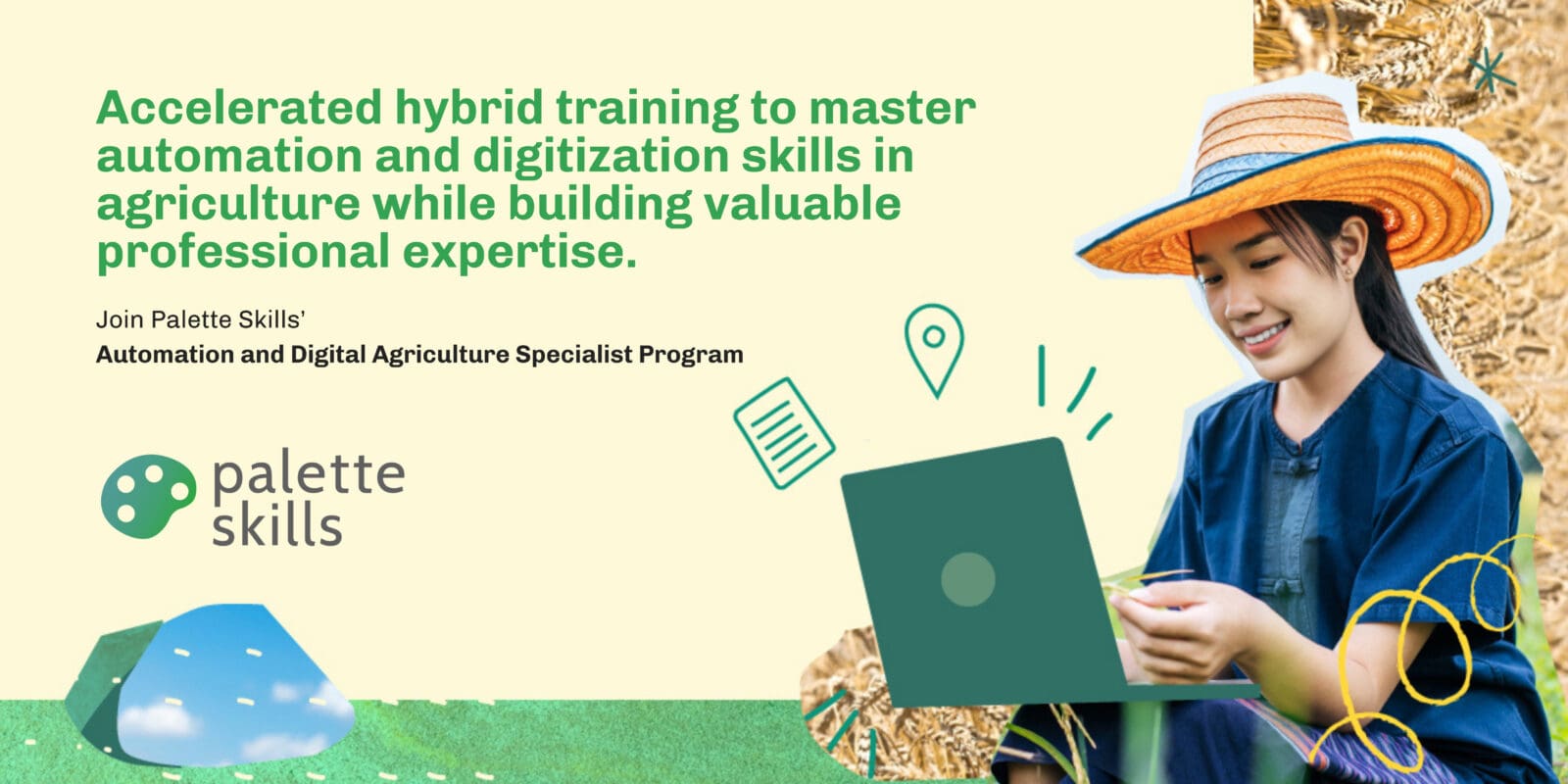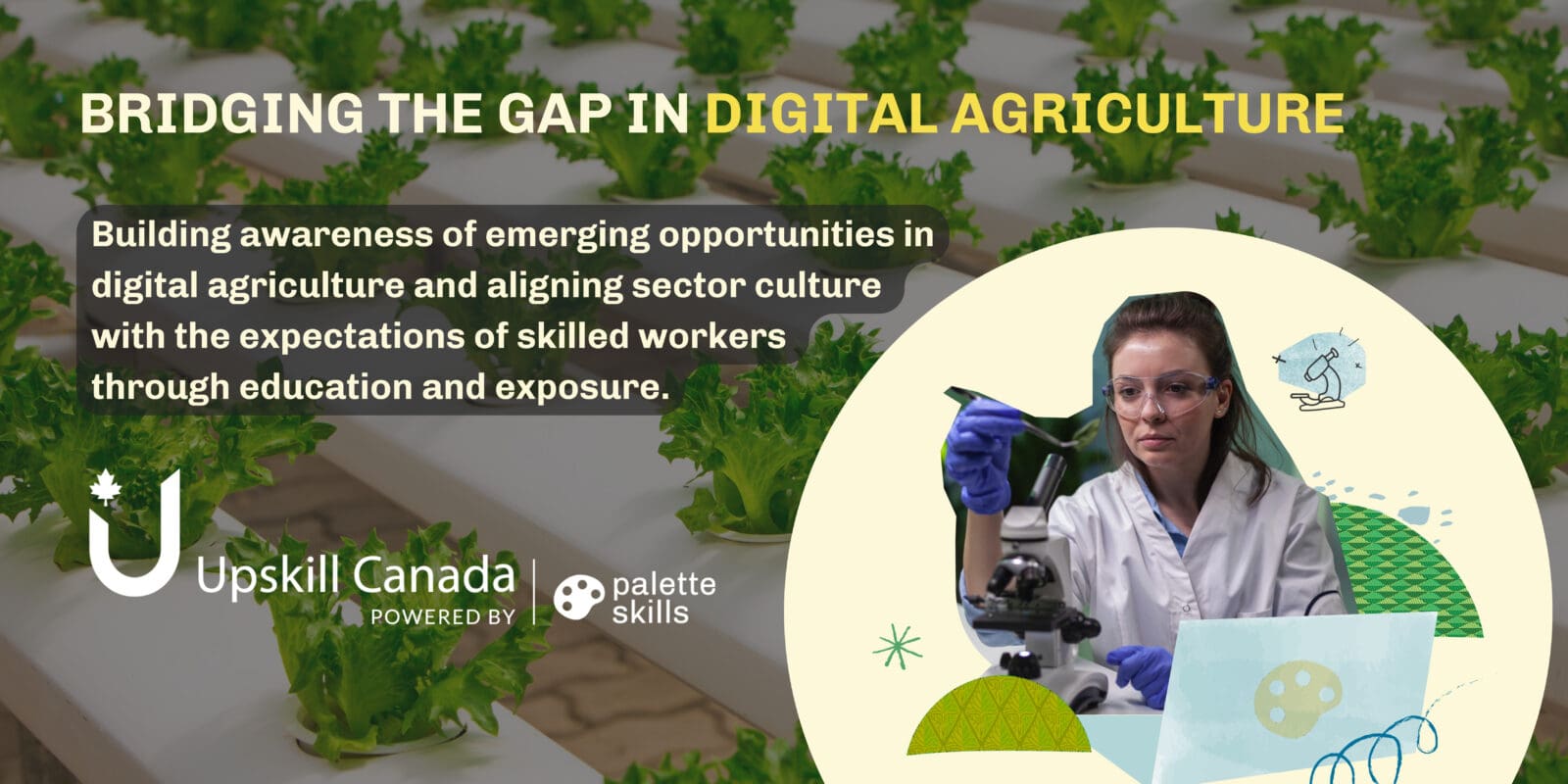The promise of innovation in agriculture
All over the country farmers are embracing sophisticated digital and precision agriculture as a way to boost productivity, enhance sustainability, and bring nutritious food to Canadians more efficiently. It’s an exciting time for digital agriculture, which means it’s a good time to take stock of the opportunities and challenges that lie ahead.
To understand the needs of digital agriculture now and in the future, Palette Skills has teamed up with Deloitte to produce a macroeconomic analysis with a focus on how to best meet the need for the skilled workers ready to implement digital solutions.
Because make no mistake, unless Canada’s agri-food sector can meet the challenges outlined in the report and produce food more efficiently and sustainably, it risks falling behind global competitors. Already, our food system is ranked as one of the most sustainable in the world according to the Food Sustainability Index. But despite promising signs of technology adoption throughout the sector, analysts warn that Canada is falling behind.
The Palette Skills-Deloitte report identifies obstacles that must be addressed if the sector is to become a global leader in innovation and exports, and these include barriers to technological adoption, a lack of skilled domestic labour, and regulatory restrictions.

Digital agriculture in Canada
Right now, digital and precision agriculture is being deployed in nearly every part of the agri-food landscape in Canada, including in primary agriculture, aquaculture, and food and beverage processing. At the same time the agriculture sector has been adopting more sophisticated technology, the number of workers employed in the industry has dropped while overall productivity has increased.
From 1997 to 2021, employment in agri-food declined from around 660,000 employees in 1997 to nearly 589,000 in 2021. The Palette Skills-Deloitte report reveals that when measured as real GDP per worker, productivity has nearly doubled in the sector since 1997. It’s an indication that despite the challenges, technology adoption in agri-food can produce dramatic results, and underlines why we need to push forward at all levels.
Aggressive adoption of digital and precision agriculture will be critically important in the near future, because the agriculture sector as a whole in Canada is facing a demographic crisis. According to recent statistics, more than 40.3 per cent of men in the farm population were 55 years and over, well over a rate of 31.1 per cent in the total population. Women in the farm population are even older, at 41.0 per cent over the age of 55 as compared to 33.5 per cent for the total population. Worryingly, the Palette Skills-Deloitte report finds that approximately 70 per cent of farmers do not have succession plans.
These and other trends in the agri-food workforce mean that the sector must come together to adopt innovation, automation, and robotics. Along with the evidence of an aging labour force in the farm population, there are indications that fewer younger people are choosing work on farms or in agriculture as a whole. Despite a heavy reliance on recent immigrants and temporary foreign workers, the number of unfilled positions in the agricultural workforce remains high, impacting productivity and prospects for growth.

Challenges in the field
Analysts and industry experts have argued that government and industry face a choice: follow a traditional model of passive technology adoption, or embark on a high-risk and high-reward strategy aimed at large-scale transformation. However, unless the right people are on the ground with the skills to help guide and implement new technologies, even the most concerted action aimed at such transformation will fail. Though Canada is currently recognized as a leader in both AI and agricultural innovation, there is a gap between these new digital tools and how effectively—and quickly—they are being adopted.
As report after report shows, these issues can be addressed only if the sector as a whole can meet the challenge of ongoing skills shortages. If not, the implications are significant. A lack of skilled workers will have a negative impact on growth and productivity, and will contribute to costly production delays. And as the Palette Skills-Deloitte report makes clear, if we fail to address the talent shortage, we put our position as a leading food producer at risk. With the world’s population expected to reach 10 billion by 2050, this country has the opportunity to be the world’s leading exporter of sustainably-produced food.
Urgent talent needs
In addition to the different kinds of foundational skills required across the agricultural workforce, there is a growing need for digital skills as the shift to more technologically-focused roles continues. Technologies such as AI, data science, engineering, sensors, drones, and biotechnology are anticipated to become more and more critical for the development and expansion of the agri-food sector. Analytical skills such as data management, problem solving, and critical thinking will be key. Technical skills related to the efficient and innovative use of digital tools and technologies as well as software development are already in high demand.
At a broader level the report argues there’s also a need to build awareness of the different opportunities emerging in digital agriculture. Many skilled workers still view agriculture as a traditional occupation, and as a result may choose employment in other sectors of the economy. It can be a challenge to bring the “culture” of the agriculture sector together with the expectations of younger workers who may be unfamiliar with the realities of rural life and farming. Solutions include giving skilled workers the opportunity to learn about growing plants, raising animals, and providing basic knowledge of the agri-food supply chain.
Upskilling and non-traditional talent
The Palette Skills-Deloitte report makes clear that rapid training and upskilling is a vitally important strategy for solving the talent shortage in digital and precision agriculture. Upskilling initiatives such as Palette Skills’ Automation and Digital Agriculture Specialist program offer an effective way to train professionals in the application of innovation and technology in the context of the agricultural sector. At the same time, employer involvement in upskilling creates an opportunity for organizations to change the way they define talent, and reap the rewards that diverse experiences can bring.
The Automation and Digital Agriculture Specialist program is a highly successful and accelerated hybrid training opportunity that equips participants with automation and digitization skills for agricultural production, while giving participants the chance to build sought-after professional skills at the same time. Developed in conjunction with industry, researchers, and entrepreneurs, the program is pioneering a new way for employers to source the talent they need to grow. We invite you to find out more about the program by downloading the course guide, and connect with skilled new talent in agtech here.







